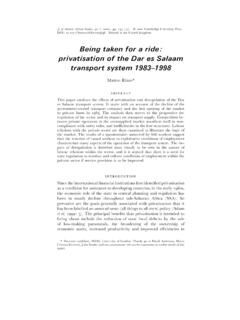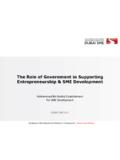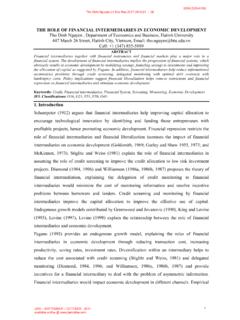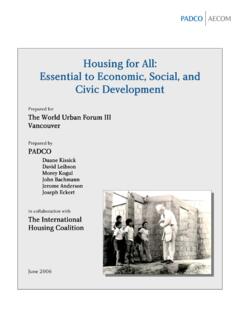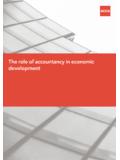Transcription of On the Role of Central Banks in Enhancing Green Finance
1 ON the role OF Central Banks IN Enhancing Green Finance INQUIRY WORKING PAPER 17/01 February 2017 UN Environment Inquiry/CIGI Research Convening 2 On the role of Central Banks in Enhancing Green Finance The UN Environment Inquiry The Inquiry into the Design of a Sustainable Financial System has been initiated by the United Nations Environment Programme to advance policy options to improve the financial system s effectiveness in mobilizing capital towards a Green and inclusive economy in other words, sustainable development . Established in January 2014, it published the first edition of The Financial System We Need in October 2015, with the second edition launched in October 2016.
2 The Inquiry s mandate currently extends to the end of 2017, with work focused on deepening and taking forward its findings. More information on the Inquiry is at: or from: Ms. Mahenau Agha, Director of Outreach The Centre for International Governance Innovation (CIGI) CIGI is an independent, non-partisan think tank on international governance. Led by experienced practitioners and distinguished academics, CIGI supports research, forms networks, advances policy debate and generates ideas for multilateral governance improvements. Conducting an active agenda of research, events and publications, CIGI s interdisciplinary work includes collaboration with policy, business and academic communities around the world.
3 For more information, please visit About this report This working paper results from a workshop the UN Environment Inquiry and CIGI held on 2-3 December 2014 in Waterloo, Canada to discuss options for a sustainable global financial system. The workshop included participants from a range of academic and research institutions from the Waterloo region and abroad, including the University of Waterloo, the University of London, Harvard University, and the University of Gothenburg. Comments are welcome and should be sent to Acknowledgements: Ulrich Volz is the author of this paper. Special thanks for very helpful comments received on presentations given at the UN Environment Inquiry-CIGI Research Convening on Design Options for a Sustainable Financial System held in Waterloo, Ontario, on 1-3 December 2014; the INET 2015 Annual Conference held in Paris on 8-11 April 2015; the 16th BSEL-Bundesbank-SWUFE Monetary Policy Workshop on the role of Monetary Policy and Financial Systems in economic development held in Berlin on 9-10 October 2015; and a workshop on Banking and Finance in Asia held at the Asian development Bank Institute in Tokyo on 21-22 December 2016.
4 Florence Dafe, Simon Dikau, Nick Robins and Simon Zadek provided very helpful comments on earlier versions of this paper. The usual disclaimer applies. Address for correspondence: Department of Economics, SOAS University of London, Thornhaugh Street, Russell Square, London WC1H 0XG, UK. Tel: +44 (0)207 898 4721. E-mail: Copyright United Nations Environment Programme, 2017 Disclaimer: The designations employed and the presentation of the material in this publication do not imply the expression of any opinion whatsoever on the part of the United Nations Environment Programme concerning the legal status of any country, territory, city or area or of its authorities, or concerning delimitation of its frontiers or boundaries.
5 Moreover, the views expressed do not necessarily represent the decision or the stated policy of the United Nations Environment Programme, nor does citing of trade names or commercial processes constitute endorsement. UN Environment Inquiry/CIGI Research Convening 3 On the role of Central Banks in Enhancing Green Finance Contents ABSTRACT .. 4 1 INTRODUCTION .. 5 2 THE CHANGING ROLE OF Central Banks .. 6 3 THE CASE FOR Central Banks TO RESPOND TO ENVIRONMENTAL AND SUSTAINABILITY CHALLENGES .. 9 The Financial and Macroeconomic Risk Argument 9 The Market Failure Argument 12 Central Banks as Credible and Powerful Actors in Developing Countries 12 4 POTENTIAL POLICY TOOLS TO IMPACT ON INVESTMENT DECISIONS AND THE CREATION AND ALLOCATION OF CREDIT.
6 14 Disclosure Requirements 14 Green Macroprudential Regulation and Climate-related Stress Testing 14 Directed Green Credit Policy Instruments 14 Green Differentiated Reserve Requirements 15 Differentiated Capital Requirements 15 Accepting Carbon Certificates as Part of Commercial Banks Legal Reserves 16 Green Quantitative Easing and Reserve Management 16 Green Finance Guidelines and Frameworks 16 Soft Power 17 5 THE LIMITS TO A SUSTAINABLE development ROLE OF Central Banks .. 18 Conflicting Objectives 18 Vesting Too Much Power in Unaccountable Institutions 18 Resistance to Change from within the Central Banking Community 19 6 CONCLUSIONS.
7 20 UN Environment Inquiry/CIGI Research Convening 4 On the role of Central Banks in Enhancing Green Finance Abstract The paper examines the role of Central Banks in greening financial systems. Given the enormous investments needed to bring about a Green transformation, the financial sector will have to play a Central role in allocating resources towards a sustainable and Green economy and stop financing activities that harm the environment. Against this backdrop, the paper examines the extent to which environmental factors impinge on Central Banks conventional goals and provides a theoretical analysis of the cases for and against Central Banks to respond to environmental and sustainability challenges.
8 Moreover, the paper explores the ways in which Central Banks (as well as financial regulatory authorities) can impact investment decisions and the creation and allocation of credit through monetary as well as micro- and macroprudential policies, including disclosure requirements, climate-related stress testing and differentiation of reserve or capital requirements according to environmental impact. Although theoretical in nature, the paper is enriched by real-world examples. While making the case for a pro-active, sustainable development role of Central Banks , the paper also discusses the risks of overstretching Central Banks mandates and vesting too much power in unaccountable institutions as well as the division of labour between Central Banks and other institutions.
9 UN Environment Inquiry/CIGI Research Convening 5 On the role of Central Banks in Enhancing Green Finance 1 Introduction Given the enormous investments needed to bring about a Green transformation towards sustainable, low-carbon development , the financial sector will have to play a Central role in allocating resources to sustainable investments and stop financing activities that harm the environment. Awareness has been rising that the financial system needs to take account of environmental and climate risks facing the real economy, and a large and growing number of Central Banks and regulators in developing and developed economies alike have already started dealing with this challenge in And yet, the academic literature on Central banking has largely ignored this topic thus far.
10 The years since the outbreak of the Global Financial Crisis have seen an intensive discourse on the changing mandate of Central Banks and their role in safeguarding financial stability ( , Goodhart 2010; Eichengreen 2011; Buiter 2012; G30 2015). As pointed out in a recent G30 (2015: xi) report on the fundamentals of Central banking, important questions have arisen as to the proper roles , duties, and obligations of Central Banks in the years ahead. However, little attention has been dedicated to the role for Central Banks in addressing environmental and climate challenges despite the material risks they pose for real economies and financial stability.
